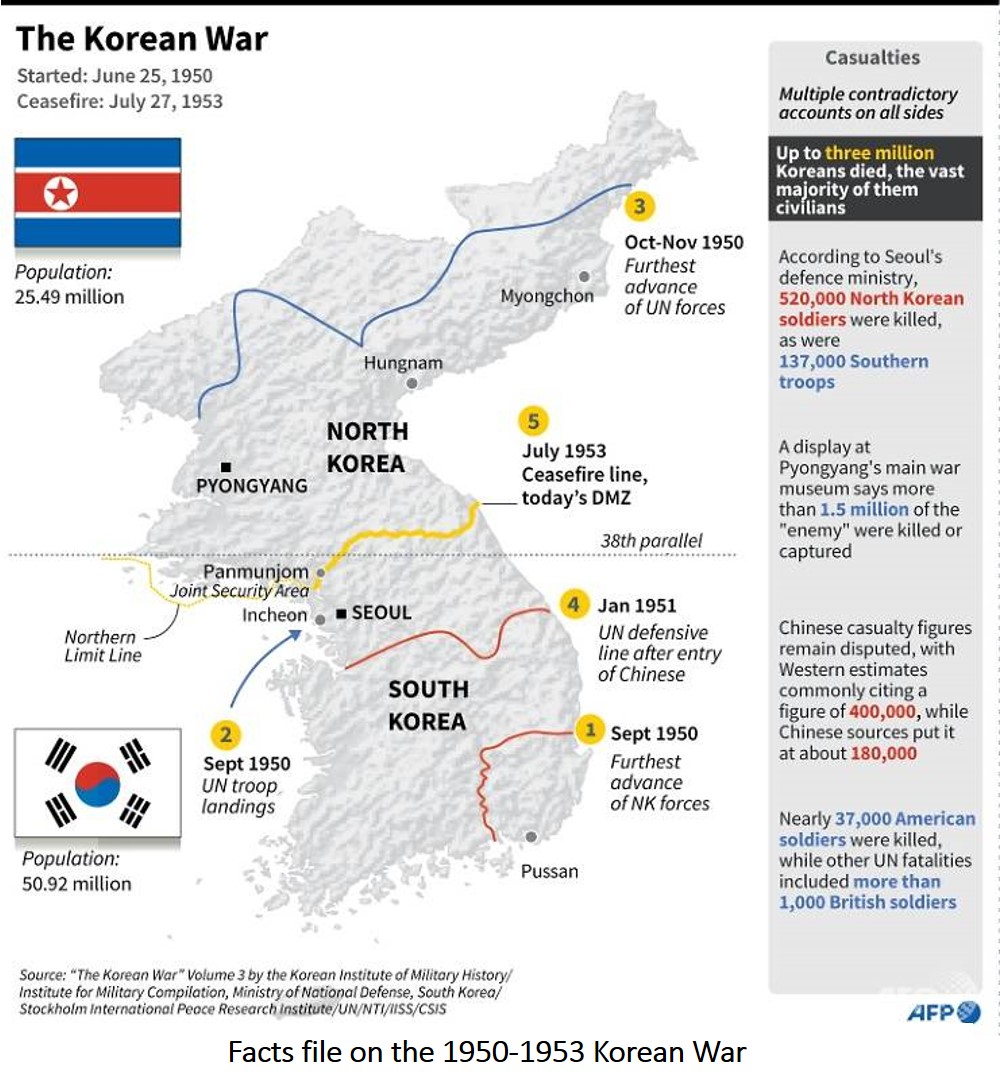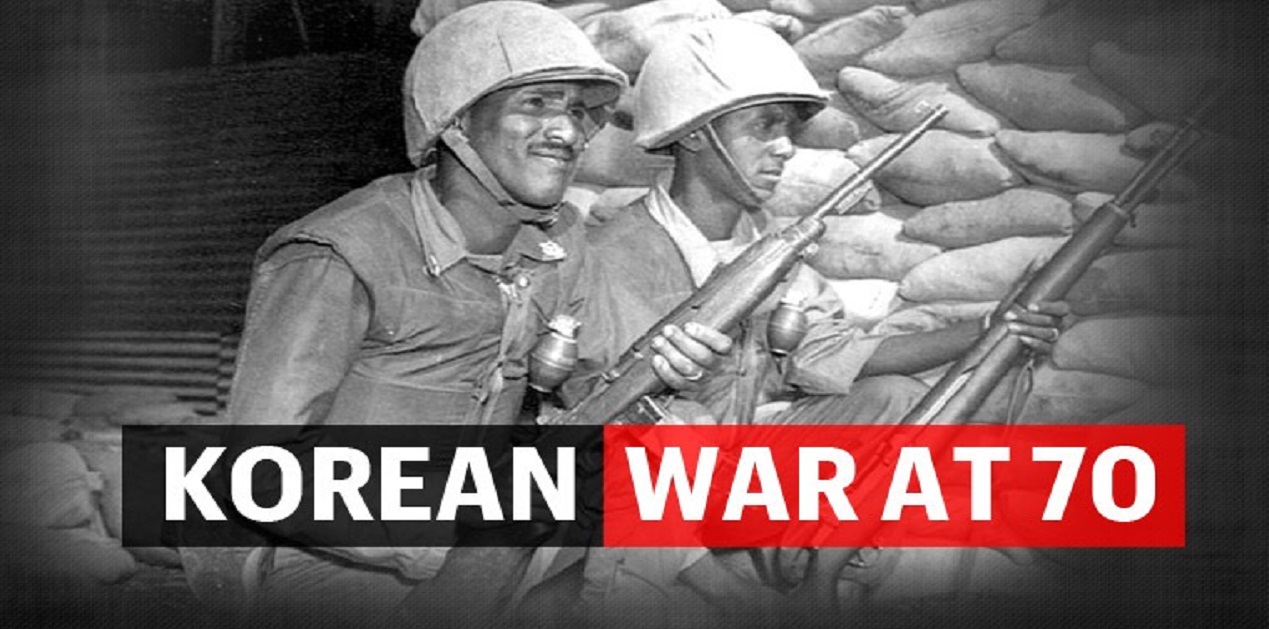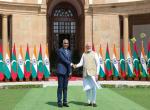June 25, 2020 marked the 70th anniversary of the outbreak of the Korean War. It was on this day when Communist North Korea invaded the US-backed South triggering a three-year long war that killed millions from both sides. On this occasion, the two allies, the United States and South Korea, reaffirmed their commitment to defending “the hard-fought peace” on the divided peninsula amid continuous threat and sabre-rattling by North Korea. On this day in 1950, the US-South Korea military alliance was born of necessity and forged in blood that continues to remain robust and acts as an anchor to the US security strategy for East Asia.
After three prolonged years of fierce fighting between 1950 to July 1953 in which 520,000 North Koreans, 137,000 Southern troops and 37,000 American military personnel laid down their lives, the fighting ended with an armistice that was never replaced by a peace treaty.1 The peninsula thus remains divided by the Demilitarized Zone, the 38th Parallel Line in Panmunjom leaving the two Koreas still technically at war. The following fact file shows how serious was this war in the Asian theatre, even after the more dreaded World War II had ended five years before.

For much of the past seven decades, the US-South Korea alliance relationship had relatively smooth sailing. The hiccup in the alliance relationship started after the North Korean threat escalated following its development of nuclear and missile development programs, which in turn led the mercurial US President Donald Trump with his thrust on “America First” policy to demand greater security burden-sharing with South Korea towards the cost of keeping 28,500 troops in the peninsula offering protection from North Korea. Notwithstanding this aberration, the allies remain firmly committed to defending the hard-fought peace on the Korean peninsula.
The anniversary celebration coincided with the deep freeze in the inter-Korean ties when North Korea blew up the inter-Korean liaison office in Kaesong industrial complex, which effectively was functioning as the embassy for both sides. It was a new cry to draw attention of the United States, making South Korea as a scapegoat. Despite that the liberal President Moon Jae-in persevered to reach out to the North Korean leader Kim Jong-un and succeeded in reaching a rapprochement, a military agreement on 19 September 2018, that resulted in three summits between the two leaders of both Koreas; this single act of demolition of what was seen as a symbol of peace and inter-Korean cooperation brought the tensed ties back to square one. This was followed by threat of military moves aimed at the South. However, good sense prevailed and the plan was soon suspended, leaving tensions still alive. South Korea’s Joong Ang Daily aptly observed in an editorial that inter-Korean relations “can turn into a house of cards at any time”.2 The editorial reminded the government that “there is no free ride in keeping peace” and that the “government and defence ministry deeply reflect on the lessons of 70 years ago”.3
The devastation of the war was telling for both sides. Like as it happened in the Indian subcontinent when partition took place and thousands of people lost their lives in fratricidal fights, leaving several families in either side fractured, so too it happened in the Korean peninsula, leaving some 100 million members of families separated. Though several attempts have been made for reunions between the families, the recurrence of tensions between the two sides has caused disruptions in such initiatives. Even till today, there are several cases of people who long to see their dear ones at least once before they die.4
The economic situation of both sides was in pathetic condition. While North Korea’s infrastructural base was relatively strong as the Japanese had developed this sector during the colonial period, South Korea was predominantly agriculture based. Until the 1980s, North Korea had a clear edge over the South in terms of economic development. In contrast when South Korea launched a massive economic development program under the dictatorship of Syngman Rhee in the post-Korean War years that laid a strong economic foundation, North Korea faced serious famines in the 1980s and 1990s, denting the country’s economy severely. At the same time precious resources were diverted for nuclear and missile development activities at the expense of economic development. While in the seven decades that have followed the Korean War, South Korea has achieved rapid industrialisation and economic growth by sheer hard work and sound economic policy, emerging as a middle power, North Korea has languished in all aspects as priorities shifted to nuclear and missile development programs.
A number of reconciliation initiatives have been made but all have failed after some flicker of promise. The ideological divide is so sharp that a lasting reconciliation appear to be a dream by all counts. Despite Moon’s peace overtures and urging North Korea to formally end the Korean War, he at the same time warned of firm response to constant threats. In a speech at the war anniversary event held at Seoul Air Base, a military compound in Seongnam, just southeast of Seoul, Moon said: “We cannot commemorate the Korean War in a genuine manner yet. That is because the War has yet to come to an end".5 Though creating the right environment for peace might be the appropriate strategy to aim for unification, removing the ideological divide shall remain a herculean task. That aspiration is a mirage at the moment.
Economically, both sides are poles apart. South Korea’s gross domestic product is more than 50 times that of North Korea and its trade is over 400 times larger.6 Though Moon warned of consequences if North Korea continues its provocations, such threats would not make any effect on the North Korean leader Kim Jong-un.
The anniversary event was sombre as it was an occasion to pay respect to fallen members and also to demonstrate Seoul’s commitment to friendly cooperation with 22 nations that fought alongside it against the invading North Korea under the United Nations flag. Indeed the noble sacrifices of the countless fallen brave soldiers that helped South Korea earn its freedom, peace and prosperity was humbly remembered with gratitude. As many as 22 countries had sent troops to fight in the Korean War under the UN flag. Video messages of gratitude were sent to 22 countries and the ambassadors of these countries were in attendance for the ceremony, demonstrating international solidarity.
Special Role Played by India
Though India strongly supported UN resolutions and military operations against North Korea during the Korean War, it wanted the reunification of the Korean peninsula. Defining what role India could play was of critical importance for the political leaders at the time as India had won its long-fought freedom just three years before and was careful not to get embroiled in another war. Moreover, getting involved in fighting would have gone against its chosen policy of maintaining neutrality. Maintaining equidistance was too not an option. Since the Soviet Union had then developed nuclear weapons, the fear of it being used was also factored in decision making. Annoying a neighbouring China would have also been detrimental to India’s interest. Therefore mediating between the two parties was the chosen approach.
India chose the ideal approach in sending a medical unit to attend the sick and wounded when the UN sent out a call to the free world for assistance. The dedicated service and essential medical aid rendered by the 60 Para Field Ambulance to the injured, both soldiers and civilians, has left a lasting impression among the Korean people till today and one of the glorious chapters in India-South Korea relations. Having no specific geo-political interests in the Korean Peninsula and maintaining a neutral position before and during the war years,7 India announced its arrival in the world as a major player displaying its soft power.
After the war ended, the issue of prisoners of war emerged as a contentious one as they needed to be returned to their country of origin but many of them refused, posing tricky challenge to those in charge of resolving the issue. This unexpected development surprised North Korea, China and the UN Command. Finally the matter was taken up at the United Nations. India was represented at the UN’s Special Political Committee by V K Krishna Menon who took on the responsibility of finding a solution to the issue of the future of the prisoners of war. On India’s initiative, the Neutral Nations Repatriation Committee was set up to resolve the issue.
There were about a total of 22,000 prisoners needed to be repatriated to their respective countries. These numbers of prisoners of war were to be handed over to the representatives of their countries. Of these a group of 88 prisoners who had not wanted to return home, were brought to India to further process their requests. This group included 12 Chinese, 74 North Korean and 2 South Korean nationals. After arriving in India, most stayed on and got assimilated into the Indian society as they did not want to return either to any neutral country or to their countries of origin. There is no clarity if those who stayed on were conferred Indian citizenship, though they received financial assistance from the Indian government so that they could start their lives all over again. They were also offered place of residence. India’s gesture was another milestone in displaying its soft power, much to the appreciation of the world. Regretfully, India did not receive any financial assistance from the United Nations and ungrudgingly bore all costs.
It was befitting therefore that Prime Minister Narendra Modi paid tribute to the soldiers on the solemn occasion of 70th anniversary of Korean War who laid down their lives “for establishing peace in the Korean peninsula”. 8 Modi’s video message was screened during the commemorative ceremony to mark the solemn occasion in Seoul. It was organised by the country’s Ministry of Patriots and Veteran Affairs and presided over by the South Korean President Moon Jae-in. Such expression of feeling, sentiment and remembrance of the past events reinforces the warmth and sincere feeling that both sides have for each other. When combined with mutual economic interests, this demonstration of soft power have also helped making India-South Korea relations robust and creating a win-win situation for both.
References
- “South Korea, US mark 70th anniversary of Korean War”, 25 June 2020,
https://www.channelnewsasia.com/news/asia/korean-war-70th-anniversary-south-korea-united-states-12868910?cid=emarsys-cna_20200626_0100_FINAL+CNA+Mon+to+Sat+newsletter+%280740%29_news - “Blood, sweat and tears”, JoongAng Daily, editorial, 25 June 2020, https://en.yna.co.kr/view/AEN20200625001000320
- Ibid.
- See, Korean War still weighs on lives in South Korea, 25 June 2020, https://www.channelnewsasia.com/news/asia/korean-war-70-year-anniversary-lives-in-south-korea-12869318?cid=emarsys-cna_20200626_0100_FINAL+CNA+Mon+to+Sat+newsletter+%280740%29_newsle
- Lee Chi-dong, “Moon urges N. Korea to formally end Korean War, warns of firm response to threats”, 25 June 2020, https://en.yna.co.kr/view/AEN20200625009352315
- Ibid.
- Neha Banka, “70 years of Korean War: India’s lesser-known role in halting it”, Indian Express, 25 June 2020, https://indianexpress.com/article/research/70-years-of-korean-war-indias-lesser-known-role-in-halting-it-6476030/
- “Modi pays tribute to bravehearts on 70th anniversary of Korean War”, 25 June 2020, https://in.news.yahoo.com/modi-pays-tribute-bravehearts-70th-anniversary-korean-war-170202510.html; https://www.indembassyseoul.gov.in/docs/1593156791PM%20office(Eng).pdf
(The paper is the author’s individual scholastic articulation. The author certifies that the article/paper is original in content, unpublished and it has not been submitted for publication/web upload elsewhere, and that the facts and figures quoted are duly referenced, as needed, and are believed to be correct). (The paper does not necessarily represent the organisational stance... More >>
Image Source: https://images.indianexpress.com/2020/06/korean-war.jpeg











Post new comment